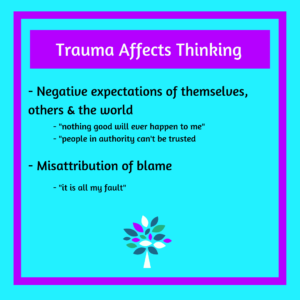Trauma Alters How You Think

A fairly common response to trauma is profound change to how one views themselves and the world. This can be true after a single traumatic incident and is a hallmark of chronic traumatization. One common way that thinking changes is that the person develops persistent and extreme negative expectations regarding themselves, others, and their future. Examples of this type of thinking include “I always have bad judgement” or “People in authority can’t be trusted” or “Nothing good will ever happen for me.”
It is also really common for folks to have persistent and erroneous beliefs about the causes of what happened to them. This type of distorted thinking usually involves blaming themselves, such as “it’s all my fault this happened to me.” When the trauma happens in the home, at the hands of a caretaker, this type of thinking can manifest as a denial of the abuse and seeing the perpetrator as blameless “my father was a very good man.” This is in large part due to a child’s need for their caretakers, and a need to believe they have their best interests at heart. It is also aided by a tendency to dissociate away the knowledge of the bad things that have happened. This is a survival mechanism for children.
These types of changes in thinking take time and effort to change. It takes having courage to put ourselves out there and learn new things about ourselves and our world. And it takes surrounding ourselves with those who will support a healthier and more balanced view. Often it takes therapy to work through.










